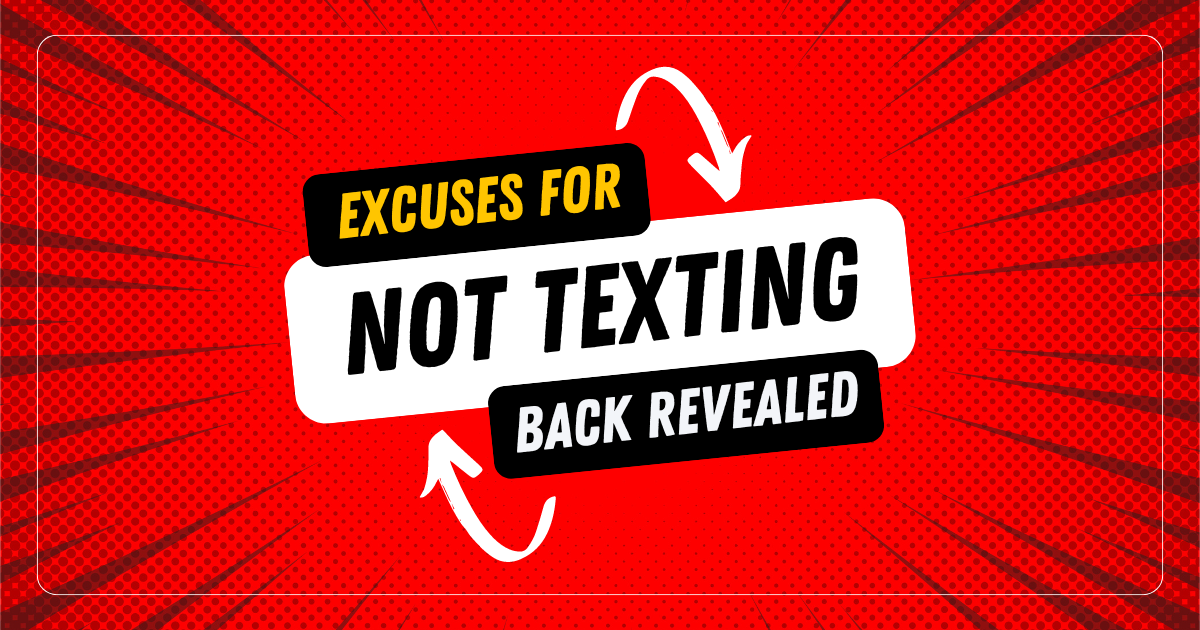Excuses for Not Texting Back Revealed
You might find yourself using a range of excuses for not texting back. Life’s distractions can easily pull you away from your phone, whether it’s juggling tasks or dealing with a dead battery. Sometimes, you simply forget to reply due to the whirlwind of notifications.
Miscommunication or signal loss can also hinder your response. Overthinking your reply or waiting for the “right” moment can leave you anxious.
Plus, technical glitches can throw a wrench in your communication. If you’re curious about more reasons behind these texting habits, there’s plenty more to explore.
Key Takeaways
- Daily life distractions, like work and family commitments, often take precedence over responding to texts.
- Technical issues, such as connectivity problems or app malfunctions, can prevent messages from being sent or received.
- Personal factors like anxiety or forgetfulness can delay replies, creating unnecessary stress.
- Social implications of silence, including guilt and emotional distance, can complicate communication.
- Sometimes, individuals simply need personal space or time to unplug from technology for mental rejuvenation.
Busy With Daily Life
You might find yourself overwhelmed with daily tasks, making it hard to respond to texts promptly. In today’s fast-paced world, juggling responsibilities like work, family, and personal commitments can leave little room for social interactions.
When you’re balancing priorities, it’s easy to let a text slip through the cracks, especially when you’re caught up in a hectic schedule.
You’ve probably had moments when you opened a message, intended to reply, but then got sidetracked by another pressing task. Whether you’re in the middle of a meeting, cooking dinner, or attending to your kids, it’s natural to prioritize immediate responsibilities over responding to a friend.
Moreover, the expectation for immediate replies can add pressure, making you feel guilty for not texting back right away. Remember, everyone experiences busy days, and understanding that life can get chaotic is vital.
Your friends likely know you’re juggling responsibilities and may even empathize with your situation. So, don’t stress too much about delayed responses; just communicate when you can. Balancing your priorities is essential for maintaining your well-being and relationships.
Phone Battery Died
We’ve all been there—your phone’s battery died just when you needed it most.
Whether it’s a common battery life issue or an unexpected emergency, this excuse can come with its own set of social implications.
Let’s explore how a dead battery can affect your communication and relationships.
Common Battery Life Issues
Many people can relate to the frustration of their phone dying just when they need it most, leaving them unable to respond to messages. To avoid this inconvenience, it’s crucial to adopt better charging habits and follow some battery lifespan tips.
Here are four key strategies to help you keep your phone charged and ready:
- Charge Overnight: While it’s tempting to charge your phone overnight, consider using a smart charger that stops charging when it’s full. This can prevent overcharging and extend your battery’s lifespan.
- Avoid Extreme Temperatures: Exposure to very cold or hot environments can damage your battery. Keep your phone in a moderate temperature range to maintain peak performance.
- Limit Background Apps: Apps running in the background drain your battery. Close unused apps to conserve power and keep your phone responsive.
- Optimize Settings: Adjust brightness and disable unnecessary notifications to reduce battery consumption. Lowering screen brightness can make a significant difference in battery life.
Emergency Situations Explained:
In the hustle and bustle of daily life, it’s easy to forget to text someone back, especially when faced with unexpected emergencies like a flat tire or a sudden illness.
You might have the best intentions, but when your battery dies or you lose reception on the subway, those timely responses slip through the cracks. It’s understandable that in such unpredictable circumstances, your unanswered text could be misinterpreted.
Whether you fell asleep, got caught up in a conversation with a friend, or simply forgot to press send, it’s important to follow up when you can. Using a portable charger or ensuring your phone charges overnight can help prevent these situations.
While everyone makes a common mistake now and then, letting the person know what happened and being honest about why you didn’t respond can make your excuse more believable and help maintain the relationship.
After all, we’ve all needed an excuse for not texting someone back at some point just remember to reply when you’re able and keep those communication lines open.
Social Implications of Silence
When your phone dies and you go silent, the social implications can be more complex than just a lack of communication. You might feel the weight of social anxiety creeping in, leading to a communication breakdown with your friends or family.
Here are some key points to reflect on:
- Emotional Distance: Silence can create a gap in relationship dynamics, making others feel neglected.
- Cultural Norms: Different cultures have varying expectations about digital etiquette, affecting perceptions of your silence.
- Impression Management: You might worry about how others perceive your absence, fearing they think you’re ignoring them.
- Psychological Effects: The stress of violating social expectations can lead to anxiety and guilt.
Navigating these nuances can be tricky. Your personal boundaries might clash with societal expectations, amplifying emotional distance.
Ultimately, it’s essential to communicate your situation post-recharge, reinforcing connections and mitigating misunderstandings. Remember, while a dead battery is an acceptable reason, the lingering effects of silence can complicate relationships.
A simple message can go a long way in maintaining healthy connections and alleviating those psychological effects.
Distracted by Other Notifications
With constant pings from social media, emails, and other apps, it’s easy to overlook a text message you intended to answer. You might find yourself in a whirlwind of notification overload, where every sound pulls your attention in a different direction.
When you’re juggling multiple tasks, these multitasking distractions can make it hard to focus on any one thing, including that text waiting for your reply.
You might glance at your phone and see a barrage of notifications vying for your attention. You think, “I’ll get back to that text in a minute,” but minutes turn into hours, and suddenly you’ve forgotten about it altogether. It’s not that you don’t care; it’s just that the constant stream of alerts can be overwhelming.
To combat this, consider silencing non-essential notifications when you need to focus. Prioritizing your tasks can help you stay on top of important messages.
Miscommunication or Loss of Signal
Experiencing miscommunication or a loss of signal can easily lead to delays in replying to texts, leaving you feeling frustrated and disconnected. It’s crucial to recognize that technology isn’t always on your side, and texting etiquette can help smooth over these hiccups.
Here are a few reasons why miscommunication might happen:
- Signal Issues: You might be in a low coverage area that prevents messages from sending or receiving properly.
- App Glitches: Sometimes, the messaging app itself can malfunction, causing texts to disappear or fail to notify you.
- Network Congestion: If too many users are on the same network, it can slow down or disrupt service, leading to delays.
- Different Communication Preferences: Not everyone checks their texts regularly, so your message could sit unread for a while.
Being aware of these factors can help you manage expectations when waiting for a response.
Overthinking the Response
Overthinking your response can lead to unnecessary stress and delay in texting back, as you weigh every word and worry about how it might be perceived. This response anxiety can keep you from hitting send, leaving the other person hanging and potentially creating misunderstandings.
You might find yourself second-guessing whether your message aligns with proper message etiquette, which only adds to the pressure.
Consider this: the more you obsess over crafting the perfect reply, the less authentic you’ll come across. Instead of letting your thoughts spiral, try focusing on the main point you want to convey. Remember, texting is often more casual than face-to-face conversation—most people appreciate sincerity over perfection.
If you find yourself stuck, take a deep breath and remind yourself that your friend likely isn’t scrutinizing your words as much as you are. Just be yourself; a simple, genuine response is often more effective than an overly thought-out one.
By reducing the weight you place on your replies, you’ll find texting becomes less of a chore and more of a natural interaction.
Intentionally Taking Time
Sometimes, you just need to hit pause and prioritize your personal space.
Unplugging from technology can help you manage feelings of overwhelm and stress, allowing for clearer thoughts.
Taking intentional time for yourself isn’t just okay; it’s essential for your well-being.
Prioritizing Personal Space
Taking a breather from constant communication allows you to recharge and focus on your own needs without the pressure of immediate responses.
Prioritizing personal space is essential for maintaining personal boundaries and practicing emotional self-care. Here’s how you can do it:
- Set Boundaries: Decide when you’re available to connect and when you need time for yourself. Communicate these boundaries to others to manage expectations.
- Schedule Downtime: Carve out specific times in your day dedicated to being offline. Use this time to engage in activities that rejuvenate you.
- Practice Mindfulness: Focus on the present moment without distractions. This helps you reconnect with your thoughts and feelings, reducing stress.
- Limit Notifications: Turn off non-essential notifications on your devices. This allows you to control when and how you engage with messages, reducing the urge to respond immediately.
Taking time for yourself isn’t selfish; it’s necessary for your emotional well-being.
Unplugging From Technology
Unplugging from technology can refresh your mind and restore your focus, making it easier to reconnect with the world around you. When you take a step back and engage in a digital detox, you create space for more meaningful interactions.
You might be surprised by how much you can learn about yourself and your surroundings when you’re not distracted by notifications or scrolling through feeds.
Mindful communication becomes easier when you limit your tech use. Without the constant buzz of your phone, you can truly listen to others and share in the moment.
This practice fosters deeper connections with friends and family, enhancing your relationships. You’ll find that conversations flow more naturally and that you’re more present.
Setting aside specific times to unplug can also improve your overall well-being. Whether it’s a weekend getaway or just an evening at home, intentionally disconnecting allows your mind to reset. You might discover new hobbies, spend quality time with loved ones, or simply enjoy some peace and quiet.
Managing Overwhelm and Stress
Managing overwhelm and stress requires intentionally carving out time for yourself to recharge and refocus. Life can get hectic, and if you don’t take a step back, it’s easy to feel buried under pressure.
Here are some effective self-care strategies to help you manage your stress:
- Set Boundaries: Learn to say no to commitments that drain your energy.
- Practice Mindfulness: Engage in mindfulness practices like meditation or deep breathing to center your thoughts.
- Schedule Breaks: Dedicate specific times throughout your day for short breaks to clear your mind.
- Engage in Hobbies: Spend time doing activities you love, whether it’s painting, reading, or gardening.
Forgetfulness or Oversight
Sometimes, life’s distractions can lead you to genuinely forget about that text you meant to reply to. You might be juggling multiple tasks, and when your attention drifts, those little memory lapses can pop up, causing you to overlook important messages.
It’s easy to think you’ll get back to it later, but before you know it, hours or even days have passed.
In our fast-paced world filled with notifications and demands, staying focused can feel like an uphill battle. You might glance at a text, plan to respond, and then get sidetracked by a phone call or an urgent email.
Suddenly, that quick reply slips down your priority list.
Waiting for the Right Moment
You might find yourself holding off on replying to a text, waiting for the perfect moment to craft just the right response. Maybe you want to guarantee your message hits the mark, reflecting good text timing and proper response etiquette. However, overthinking can lead to delays that might frustrate the sender.
Here are some tips to help you navigate waiting for that ideal moment:
- Read the Context: Consider the topic. Is it light-hearted or serious? Your response should match the tone.
- Timing Matters: If it’s a busy time for you, it might be best to wait until you can focus on crafting a thoughtful reply.
- Avoid Perfectionism: Sometimes, trying to find the perfect words can lead to procrastination. A sincere, simple reply often suffices.
- Set a Time Limit: Decide how long you’ll wait before responding. This prevents you from overanalyzing and losing the conversation’s momentum.
Ultimately, finding the right moment can enhance your communication, but don’t let it become an excuse for silence.
Feeling Overwhelmed or Anxious
While waiting for the right moment to reply can feel strategic, it can also amplify feelings of overwhelm or anxiety, making it harder to respond at all.
You might find yourself caught in a loop of anxiety triggers, like worrying about how your message will be received or fearing that you’ll say the wrong thing. These thoughts can spiral into emotional responses that paralyze you, leaving you staring at your screen instead of typing a simple reply.
It’s easy to think that not responding right away is better than sending a hasty message. However, this hesitation often only deepens your sense of unease.
You might imagine the worst-case scenarios, convincing yourself that your silence is creating tension. In reality, most people understand that life gets busy and that everyone has their moments of overwhelm.
The key is to recognize when anxiety is taking over. Try setting a timer for a quick five minutes to jot down your thoughts. This can help clear your mind and make it easier to send a genuine text. Remember, it’s okay to acknowledge your feelings, and often, a simple “I’ll get back to you soon” can relieve some pressure.
Technical Issues or Glitches
We’ve all been there—your phone’s acting up, and suddenly, you’re cut off from the world.
Network connectivity issues, app glitches, or even compatibility problems can leave you scrambling for an explanation.
Let’s explore how these technical hiccups can serve as the perfect excuse for not texting back.
Network Connectivity Problems
Ever wondered how often network connectivity issues can disrupt your ability to text back promptly? You might be in the middle of a conversation when suddenly, your messages won’t send. This can lead to frustrating misunderstandings, especially when network outages occur or signal interference pops up unexpectedly.
Here are four common connectivity problems you might face:
- Network Outages: Sometimes, your service provider has issues that can bring everything to a halt.
- Weak Signal: If you’re in a basement or remote area, your signal strength can plummet.
- Interference: Nearby electronic devices or physical barriers can mess with your connection, making texting impossible.
- Overloaded Networks: High traffic during peak times can slow down your service, leaving you unable to send messages.
These connectivity problems can create a perfect storm of excuses for not responding. So, next time you’re waiting for a reply, consider that your friend might just be battling their own network issues. Keep this in mind before jumping to conclusions!
App Malfunctions Occurred
Texting back can sometimes be thwarted by pesky app malfunctions that leave you wondering what went wrong. You might find that your messaging app freezes or crashes unexpectedly, making it impossible to respond promptly.
These technical glitches can arise after app updates, where new features might inadvertently disrupt the user experience.
Imagine you’re in the middle of typing a thoughtful reply, and suddenly, the app shuts down. Frustrating, right? Or perhaps you send a message, but it never actually goes through due to a sync issue. These problems can easily lead to misunderstandings, as the other person might think you’re ignoring them.
To mitigate these issues, it’s crucial to keep your apps updated regularly. Developers often release patches to fix bugs and improve performance, enhancing your overall user experience. If you notice persistent problems, don’t hesitate to reach out to support or check online forums for solutions.
After all, a smooth messaging experience is what we all crave, allowing us to stay connected without the hassle of app malfunctions. So, next time you can’t text back, consider whether an app glitch might be at play.
Device Compatibility Issues
Device compatibility issues can often leave you stranded, unable to respond to messages when your device simply isn’t playing nice with the app. You might find yourself staring at a frozen screen or an error message, wondering what went wrong.
Here are four common causes of device compatibility issues:
- Outdated Device Updates: If you haven’t updated your device in a while, you might miss out on important compatibility fixes.
- Software Compatibility: Some apps require specific operating system versions to function correctly. If your OS is out-of-date, the app may not work as intended.
- App Glitches: Sometimes, the app itself has bugs that can lead to compatibility issues, regardless of your device’s updates.
- Cross-Platform Limitations: If you’re using an app that isn’t designed for both iOS and Android, you might run into problems when trying to communicate with someone on a different platform.
Staying on top of device updates and ensuring your software is compatible can help you avoid these frustrating situations.
Conclusion
In the whirlwind of daily life, it’s easy to let a text slip through the cracks like sand through your fingers, leading to what might seem like excuses for not texting back.
Whether your phone’s battery died or you’re simply caught in a web of overthinking, remember that silence doesn’t always mean disinterest.
Life’s chaotic dance sometimes pulls us away from our screens.
So, when you finally reconnect, let that message be a warm hug, bridging the gap and reminding you both that you’re still in each other’s hearts.
Frequently Asked Questions
How Can I Politely Explain My Delayed Response?
To politely explain your delayed response, use courteous language and acknowledge the wait. You might say, ‘I apologize for the delay; I appreciate your patience and wanted to guarantee my response was thoughtful. Thanks for understanding!’
What if I Genuinely Forgot to Reply?
You know those days when your mind’s a busy train station? Forgetful moments happen to everyone. Just acknowledge the communication gaps, say you genuinely forgot, and reconnect. It shows you care, despite the slip-up.
How Can Notifications Be Managed to Avoid Distractions?
To manage notifications and minimize distractions, adjust your notification settings and enable distraction-free mode. This way, you can focus on important tasks without constant interruptions, helping you stay productive and engaged with what matters most.
Is It Okay to Take Time Before Responding?
It’s perfectly okay to take time before responding. Setting your response time based on personal boundaries helps maintain your well-being. Prioritize what matters, and don’t feel pressured to reply immediately. Your time is valuable!
What Are Signs of Feeling Overwhelmed or Anxious?
Ever wonder how to recognize stress signals? If you’re feeling restless, irritable, or fatigued, these might be anxiety triggers. Pay attention to your body’s cues; they’re essential for understanding your emotional state and seeking help.







